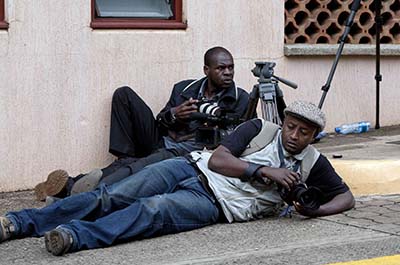The jumpy, cell phone clips of journalists and security officers crouching outside the upscale Westgate Shopping Mall in the capital, Nairobi, permeated the TV screens across Kenya for four days. Edgy local and foreign reporters hid behind vehicles as gunfire shots, repeated explosions and smoke emanated from a supermarket inside.
The Somali militants Al-Shabaab claimed responsibility for the Saturday morning attack via Twitter, proudly listing the names of their gunmen, according to news reports. At first we all assumed it was a violent robbery, until the militants claimed the attack, which killed a reported 67 people, was in retaliation for Kenya’s military action in Somalia.
“I thought it was just a straightforward thing, something I could cover in an hour,” veteran Nation reporter Andrew Teyie told me. “But I saw all the tension, the blood, a chaotic scene while people were being rescued and pulled out of the mall, and knew it was something else.” Teyie covered terrorist attacks in Nairobi before as a young reporter during the 1998 bomb attack on the US Embassy. “But this situation is different since it has stretched the pain, elongated suffering for three days,” he said.
The pain is particularly acute for Teyie and other colleagues after learning the gunmen shot dead a popular radio and television presenter Ruhila Adatia-Sood. Working for the Radio Africa Group, which includes Kiss TV, East FM, and the Star newspaper, among others, Ruhila was hosting a children’s cooking competition in the mall when the attack took place, colleagues said.
“She was the sunshine in the office, someone who helped us all get through the day,” Radio Africa Head of Graphics and Animation Patrick Ochieng told me. Recently married and expecting her first child, Adatia-Sood died of heavy bleeding from gunshot wounds in a hospital hours after the attack began, according to news reports.
A true “Nairobian,” Adatia-Sood was the last born in a family of four girls. According to her sisters, Pinky, Farah and Shina, their famous sister was ambitious from an early age. Fellow East FM presenter and columnist Kamal Kaur, who was at the same event, recalled how he had given his daughter’s baby cradle to help Adatia with the new arrival. “I have lost a dear colleague…I don’t know what to do or say. I don’t know who else we have lost today,” Kaur said on the first day of the attack. Her funeral will be held on Thursday at the Aga Khan Pavilion here in Nairobi.
Covering Westagate was challenging for everyone, including foreign correspondents with years of war coverage experience.
“Over the past two decades, I have found myself in numerous war zones in Africa, Asia and the Middle East. I survived bombing in Baghdad, mortar attacks and street battles in Liberia, Libya and Yemen,” Washington Post East Africa Bureau Chief Sudarsan Raghavan wrote in a blog. “But what unfolded Saturday felt markedly different.The war on terrorism had hit uncomfortably close to home […] the interviews with victims felt more personal than other tragedies I have covered.”
Local and foreign photographers alike, such as Nation‘s William Oeri and New York Times’ Tyler Hicks, have risked life and limb venturing inside the shopping centre to cover the three day tragedy. “I had a clear view in there,” recalled Hicks in a blog after taking incredible shots of the tragedy, “I could see that there were multiple bodies lying dead in the mall, some lying together just next to where they were having lunch at a café. It seemed everywhere you turned there was another body.”
Journalists with Somali backgrounds are particularly affected by Saturday’s raid. Senior Editor for Radio Bar Kulan, Abdirahman Hussein, lost a friend, a Somali national named Yasin Hersi, who worked for a local non-governmental organization, he told me. Hussein had covered events at Westgate Mall until Al-Shabaab announced responsibility for the attack.
“That’s when more fear came to the Somali community here in Nairobi,” he said. The UN-backed Somali news station Bar Kulan reduced staffing at the station as a precaution, Hussein said, fearing reprisal attacks against Somalis by an angry Kenyan public. The predominantly Somali Eastleigh region of Nairobi is gradually becoming a ghost town, he added. Residents are locking themselves indoors, fearing retribution from citizens and police, just as they experienced in December and January after police raided the area ostensibly to search for suspects of a December grenade attack in Eastleigh.
The siege of Westgate Mall was finally over Tuesday. Kenyan troops have managed to capture 11 suspects after securing the building. But the work of journalists is still ongoing with a multitude of unanswered questions. While the official death toll figures claim 67, the Red Cross has reported 71 people are registered missing. Journalists still do not know what happened to the hostages that were holed up inside or how the gunmen managed to accrue a huge arsenal within the mall. Government Spokesman Manoah Esipisu’s phone was switched off today as Kenyans published a list of 85 unanswered questions. While many questions remain, so do the scars all the media suffered covering this tragedy. This is why Kenya’s Media Council has set up a helpline (0702-222-111) for all journalists who covered the Westgate Mall attack in need of counseling services.
